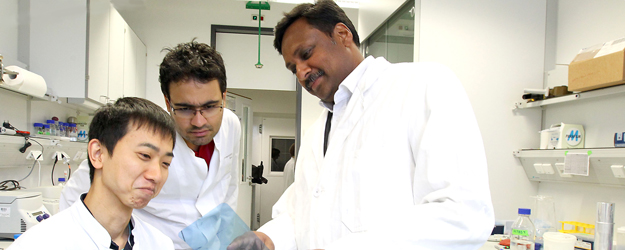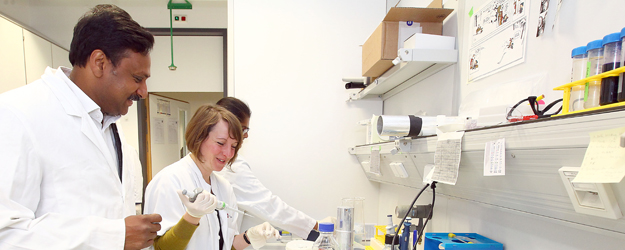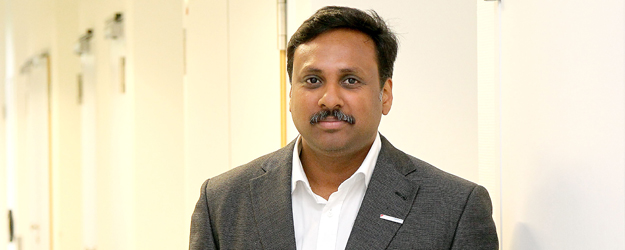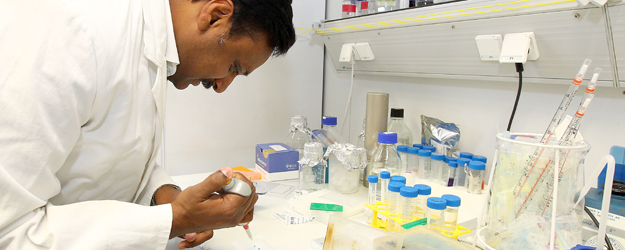8 December 2014
In the person of Krishnaraj Rajalingam, the Research Center for Immunotherapy of Johannes Gutenberg University Mainz (JGU) has been very lucky to acquire one of the world's foremost cell biologists. The newly appointed Heisenberg Professor focuses on the molecular signal pathways that regulate a wide variety of different processes within cells. He investigates not only the causes of cell growth and cell differentiation but also the pathogenesis of tumors and cancer and thus supplies concepts for new treatment approaches.
There is a bit of confusion at the research center. "You want to speak to Professor Rajalingam? Never heard of him." Then it dawns on his colleague. "Oh! You probably mean Krishna. Of course, you'll find him over there."
Professor Krishnaraj Rajalingam has been in Mainz since September 2014 after being awarded a Heisenberg Professorship for Cell Biology sponsored by the German Research Foundation (DFG) at JGU's Research Center for Immunotherapy (FZI) in July. Although his current office is only a temporary solution, he doesn't seem particularly concerned. The 37-year-old is among the top researchers in his field, but in conversation that sort of fades into the background.
Molecular Signaling Unit
"Would you like to meet my work group?," asks Rajalingam. It's important to him, so we go next door into the Genetics Lab. Seven young people from Japan, Poland, India, and Germany, postdocs and students, work closely together here. Rajalingam built up this group in Frankfurt am Main. From 2008 he researched and worked as a stipendiary of the DFG's Emmy Noether Program at Frankfurt's Goethe University and four years later was admitted to the PLUS3 Perspectives Program of the Boehringer Ingelheim Foundation.
Both were important stations of his career. But now, Rajalingam is just "Krishna" to Dr. Haijme Yurugi, Juliane Mooz, and the other members of his Molecular Signaling Unit. And it's clear he’s comfortable here. "What we do here is basic research," he says, "that is fundamental and very important to many medical fields. We are interested in a class of molecules that function as signaling devices in cells."
In effect, they are looking at how information is transmitted within and between cells. A vast range of different processes can be initiated by such molecular signals. They control cell growth and proliferation as well as cell migration and cell differentiation. But they also play a decisive role in cell death and in the development of tumors. The so-called RAF kinases, for example, play a role in many forms of cancer.
A cell's communication device
"We want to understand how all of these molecules interact and how cells react to them," adds Rajalingam. "Research in this area has made enormous progress since the 1980s. We have identified a remarkable 566 kinases involved in signal transmission alone. So you could say we are already acquainted with nearly all the players in the field. We have an enormous amount of data available to us. What we need to do now is determine how these players play their game and how we can intervene in what they get up to. It's a little like playing with Lego bricks – you put the tiny individual components together and you come up with something new." For example, his work group has already been able to identify the role of some of these players, called the apoptosis inhibitors, when it comes to the spread of cancer in the body.
Rajalingam's investigations are relevant to other core research fields at the Mainz University Medical Center. In addition to immunotherapy, these include the translational neurosciences and translational vascular biology. Rajalingam will also be providing important input for these research fields – far beyond his five-year professorship. Mainz is to become an important career base for the molecular biologist from India, whose CV reads almost as if he has been working toward just such a goal.
Rajalingam was born in 1977 in Mayiladuthurai in India. His grandfather operated a clinic there and inspired him to study medicine. From 1995 to 2000, Rajalingam studied life sciences at the Bharathidasan University and then came to Germany, where he wrote his doctoral dissertation at the Max Planck Institute for Infection Biology in Berlin. In 2006, he moved to the Julius Maximilians University in Würzburg, and from there on to Frankfurt am Main.
"Basically a signaling guy"
"In the meantime I have actually become half German. When I go back to India, I get homesick," says Rajalingam with a smile, before becoming more serious again. "It was the science that brought me to Germany." Then he again puts others in the spotlight. "You need good mentors to become a good researcher. I had fabulous mentors: Thomas Rudel, Thomas Meyer, Ulf Rapp, Ivan Dikic, and a few more."
Rajalingam switches back and forth between German to English when he is explaining something scientifically complex or if he wants to make a particular point: "I'm basically just a signaling guy," he says of himself.
And as a 'signaling guy', he has special plans for Mainz. "I would like to set up here a center of excellence for molecular cell biology, which would work closely with all other relevant departments of the university." As a professor, he also keeps an eye on the young researchers in his field. Their training is something that is close to his heart. His motto is "Educate and Inspire".
A culture of inquiry
Among other things, he is also involved in the TransMed Science Day at Mainz University Medical Center. "I want to promote a culture of inquiry." And it was for that reason that one of Rajalingam's mentors, Ivan Dikic, didn't stop at just giving a presentation at the first Science Day at the TransMed Graduate School in November 2014. One event on the program was called "Coffee with Ivan". "I also bring students together with editors of the scientific journals and business representatives. It is important that they are familiar with their career opportunities."
In addition, Rajalingam organizes a similar conference in India – and he also has to keep tabs on the long-term financing concept of his plans. "I am always working," he says. However, he does not appear to find his work a burden – at least not when he is involved in research with his group. Then he's just Krishna, "the signaling guy," who is at home whether in Berlin, Frankfurt, or Mainz.




